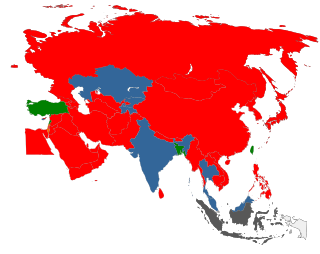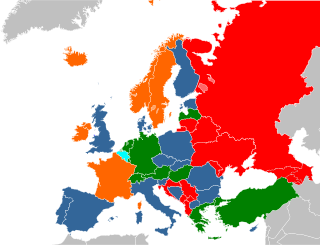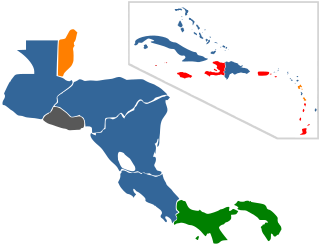Related Research Articles

The legality of prostitution in Asia varies by country. There is often a significant difference in Asia between prostitution laws and the practice of prostitution. In 2011, the Asian Commission on AIDS estimated there were 10 million sex workers in Asia and 75 million male customers.
Forced prostitution, also known as involuntary prostitution or compulsory prostitution, is prostitution or sexual slavery that takes place as a result of coercion by a third party. The terms "forced prostitution" or "enforced prostitution" appear in international and humanitarian conventions, such as the Rome Statute of the International Criminal Court, but have been inconsistently applied. "Forced prostitution" refers to conditions of control over a person who is coerced by another to engage in sexual activity.
Prostitution in the Philippines is illegal, although somewhat tolerated, with law enforcement being rare with regards to sex workers. Penalties range up to life imprisonment for those involved in trafficking, which is covered by the Anti-Trafficking in Persons Act of 2003. Prostitution is available through bars, karaoke bars, massage parlors, brothels, street walkers, and escort services.
Prostitution in Lebanon is nominally legal and regulated. However, no licences have been issued since 1975. In modern Lebanon, prostitution takes place semi-officially via 'super night clubs', and illegally on the streets, in bars, hotels and brothels. UNAIDS estimate there to be 4,220 prostitutes in the country.

The legality of prostitution in Europe varies by country.
Prostitution in Kuwait is illegal, but common. Most of the prostitutes are foreign nationals.
Prostitution in Albania is illegal.
According to the United States Department of State, "Thailand is a source, destination, and transit country for men, women, and children subjected to forced labour and sex trafficking." Thailand's relative prosperity attracts migrants from neighboring countries who flee conditions of poverty and, in the case of Burma, military repression. Significant illegal migration to Thailand presents traffickers with opportunities to coerce or defraud undocumented migrants into involuntary servitude or sexual exploitation. Police who investigated reaching high-profile authorities also received death threats in 2015.

Human trafficking is the act of recruiting, transporting, transferring, harboring, or receiving individuals through force, fraud, or coercion for the purpose of exploitation. This exploitation may include forced labor, sexual slavery, or other forms of commercial sexual exploitation. It is considered a serious violation of human rights and a form of modern slavery. Efforts to combat human trafficking involve international laws, national policies, and non-governmental organizations.
Indonesia is a source, transit, and destination country for women, children, and men trafficked for the purposes of commercial sexual exploitation and forced labor. The greatest threat of trafficking facing Indonesian men and women is that posed by conditions of forced labor and debt bondage in more developed Asian countries and the Middle East.
Prostitution in Belarus is illegal but commonplace and is an administrative, rather than criminal, offence. Running a brothel is forbidden and engaging in other means of pimping are punishable by up to 10 years in prison. UNAIDS estimated there were 22,000 sex workers in Belarus in 2016.

In 2009, Papua New Guinea was a source, destination, and transit country for men, women, and children subjected to trafficking in persons, specifically forced prostitution and forced labor. Women and children were subjected to commercial sexual exploitation and involuntary domestic servitude; trafficked men were forced to provide labor in logging and mining camps. Children, especially young girls from tribal areas, were most vulnerable to being pushed into commercial sexual exploitation or forced labor by members of their immediate family or tribe. Families traditionally sold girls into forced marriages to settle their debts, leaving them vulnerable to involuntary domestic servitude, and tribal leaders trade the exploitative labor and service of girls and women for guns and political advantage. Young girls sold into marriage were often forced into domestic servitude for the husband's extended family. In more urban areas, some children from poorer families were prostituted by their parents or sold to brothels. Migrant women and teenage girls from Malaysia, Thailand, China, and the Philippines were subjected to forced prostitution, and men from China were transported to the country for forced labor.
Oman ratified the 2000 UN TIP Protocol in May 2005.
Malaysia ratified the 2000 UN TIP Protocol in February 2009.
Prostitution is illegal in Maldives, but occurs on a small scale. A 2014 survey by the Human Rights Commission of the Maldives (HRCM) estimated there were 1,139 female prostitutes on the islands. Some women enter the country posing as tourists but then engage in sex work.
Prostitution in Bahrain is illegal but it has gained a reputation in the Middle East as a major destination for sex tourism.
Prostitution in Tajikistan is legal, but related activities such as soliciting, procuring and brothel keeping are prohibited. Prostitution has increased within the country since the collapse of the Soviet Union. UNAIDS estimate there are 14,100 female sex workers in Tajikistan. Government official figures for 2015 were 1,777 prostitutes and 194 brothels. Prostitution occurs on the streets and in bars, restaurants, nightclubs and saunas, and HIV prevalence is 3.5% amongst sex workers.
Prostitution in East Timor is legal, but soliciting and third party involvement for profit or to facilitate prostitution is forbidden. Prostitution has become a problem since the country gained independence from Indonesia in 2002, especially in the capital, Dili. There are estimated to be 1,688 sex workers in the country.

Legality of prostitution in the Americas varies by country. Most countries only legalized prostitution, with the act of exchanging money for sexual services legal. The level of enforcement varies by country. One country, the United States, is unique as legality of prostitution is not the responsibility of the federal government, but rather state, territorial, and federal district's responsibility.
Prostitution in Fiji is legal, but most activities connected with it are illegal: brothel keeping, pimping and buying or selling sex in public. Street workers make up the bulk of Fiji's prostitutes. Many of the prostitutes are Asian, especially Chinese that provide sexual services for the growing number of tourists arriving in the country and also locals. Some come into the country on student visas. In 2014, it was estimated that there were 857 sex workers in Fiji. Even though buying and selling sex in public is illegal in Fiji, police have no legal authority to arrest prostitutes without an official report being lodged for the police to take action.
References
- 1 2 "The Legal Status of Prostitution by Country". ChartsBin. Retrieved 28 January 2018.
- 1 2 "Oman 2017 Trafficking in Persons Report". U.S. Department of State. Archived from the original on 3 July 2017. Retrieved 28 January 2018.
 This article incorporates text from this source, which is in the public domain .
This article incorporates text from this source, which is in the public domain . - 1 2 Al Shaibany, Saleh (23 August 2017). "Oman cracks down on prostitution in an attempt to 'clear streets'". The National. Retrieved 28 January 2018.
- ↑ Oman Royal Police Handbook. Intl Business Pubns USA. 20 March 2009. p. 113. ISBN 978-1438736907.
- 1 2 3 Melissa Hope Ditmore (2006). Encyclopedia of Prostitution and Sex Work. Vol. 1. Greenwood Publishing Group. pp. 40–41. ISBN 9780313329692.
- ↑ "ROP arrests over 100 women for prostitution in Al Khuwayr - Oman". Muscat Daily News. 16 August 2017. Archived from the original on 28 January 2018. Retrieved 28 January 2018.
- ↑ Fahad Al Mukrashi (30 November 2016). "Oman tightens tourist visa rules to curb prostitution". Gulf News.
- ↑ "Oman 2018 Trafficking in Persons Report". U.S. Department of State. Archived from the original on 30 July 2018. Retrieved 30 July 2018.